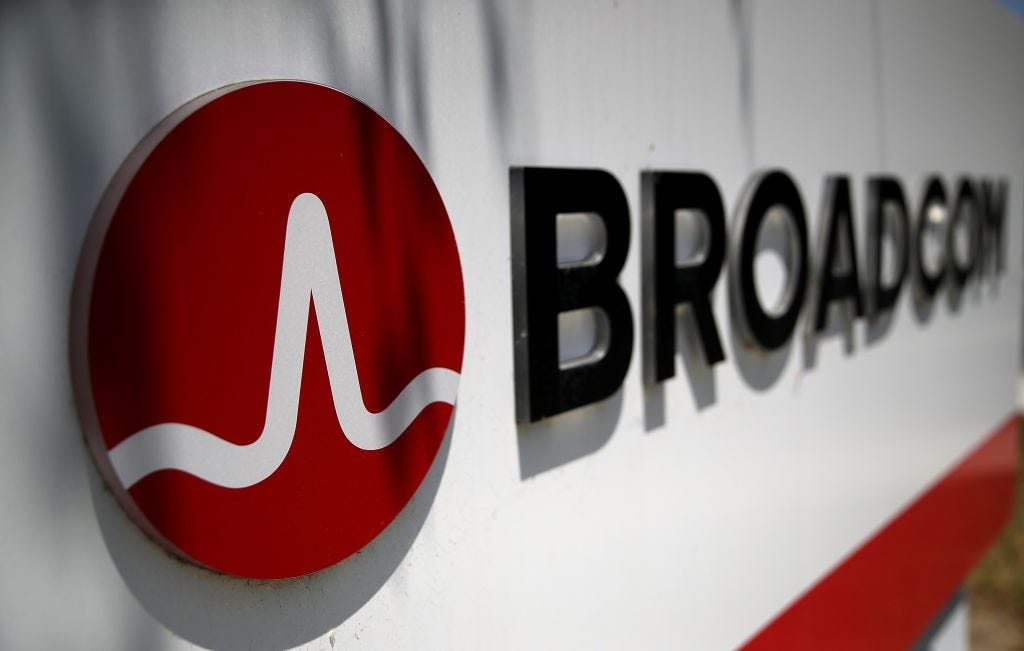If you have enjoyed reading this article, please consider liking, restacking, or sharing with your friends! Your engagement is the biggest support. ❤️
Hi fellow investors! Today we are discussing AVGO as part of the company deep dive series.
As a former hedge fund investor, I am sharing detailed valuation framework and entry/exit price to help you maximize upside potential and minimize downside risk.
You can find company deep dives, actionable stock ideas, and earnings recaps or search past articles by ticker using the directory here.
SUBSCRIBE BELOW so you don’t miss the timely and in-depth stock analysis!
Company History
Broadcom is a semiconductor and infrastructure software company and its history went back 60 years ago. It’s market cap passed $1T and is one of the largest companies in the world.
Broadcom was founded in 1969 by Jerry Sanders and other technology professionals. Initially, its product portfolio primarily consists of memory products and other computer components. Back then it called HP Associates, as the semiconductors division of Hewlett Packard. This division separated from HP as part of the Agilent Technologies spinoff in 1999.
The company went public in 2009 as Avago and stock ticker was AVGO. Avago has been very acquisitive and completed multiple acquisitions in the semiconductor space between 1999 and 2017.
In 2016, Avago changed name to Broadcom (but kept the ticker as AVGO) as it acquired (or you could say merged with) an equally large company Broadcom. From the acquisition, Avago doubled its enterprise value from ~$40B to ~$80B.
In 2018, Broadcom completed its first big software acquisition by acquiring CA technologies for $18.9B. This move shocked investors and stock plummeted initially when the deal was announced. Usually when a semiconductor or hardware company acquires something not in the space, investors get worried as they view it as a signal of “lack of growth opportunities” in the core business.
Since then Broadcom has acquired even more software companies, including the enterprise security business of Symantec, and later VMware, a household name in virtualization and a dominant cloud computing software vendor. The deal was valued at $61B.
Although initially controversial, these software acquisitions have proved to be smart decisions, as they diversify the core semiconductor business, which are generally much more volatile, and provide stable free cash flow.
Strong Track Record of Shareholder Returns
Broadcom is very shareholder friendly and has demonstrated strong and consistent shareholder returns.
Broadcom offers strong shareholder returns, from both stock price appreciation and dividends. Dividends alone have grown at a compound annual growth rate of 32% since 2016. Stock price have also appreciated by 18x in the same time period.
Key Products
Broadcom has two main business segments today, Semiconductor Solutions and Infrastructure Software.
Within the Semiconductor Solutions segment, Broadcom supplies to a variety of end markets. Its main product offerings differ by end markets:
In networking, key product offerings include ethernet switching and routing silicon, custom silicon solutions and optical and copper PHYs. These chips are commonly seen in data centers and enterprise networking.
In wireless, key product offerings include RF front end modules and WiFi SoCs. One large customer in this segment is AAPL. You will find Broadcom’s chips in iPhones.
Storage, broadband and industrial are the other end markets that AVGO servers today, although the % of total sales have decreased over the years due to strong networking revenue and software acquisitions.
Custom Silicon - AI Darling?
Custom Silicon (or Custom ASIC) is a customized chip solution, usually designed for hyperscale cloud customers. They are different from Nvidia’s merchant GPU, as these custom ASICs are customized for specific workloads.
They are designed for specific applications to improve power efficiency and optimize performance. As a result, the chip cost is also lower compared to the standard off-the-shelf GPU solutions.
For example, a custom ASIC used for AI compute in might have a price tag of several thousand dollars. NVDA’s latest Blackwell GPU can cost more than $30,000! The cost benefit of custom ASIC is clear to hyperscale customers, who also happen to be the largest users for these high performance compute chips.
The below information is for paid subscribers only (we will discuss what makes AVGO so special, CEO Hock Tan, what are the investment risks, and upside / downside to the stock here). Trust me, it will be well worth it! (monthly subscription only costs 2 cups of coffee).
To get a sense of what my company deep dive covers, please check out this free analysis on AMD here:
Keep reading with a 7-day free trial
Subscribe to Analyst Journal to keep reading this post and get 7 days of free access to the full post archives.





